Van Life Albania Travel
Adventurous Albania is amazing! We absolutely loved our time there travelling around the country in our campervan. You really get to embrace the spirit of adventure and uncover what we think is absolutely one of Europe’s hidden gems.
Albania has so much to offer: gorgeous beaches, pristine mountains, and fascinating historical sites, it has something to offer every traveller. The country’s relatively low cost of living, friendly locals and relaxed wild camping laws make it one of the easiest countries to do van life in, in the whole of Europe. It is truly a unique and adventurous destination.
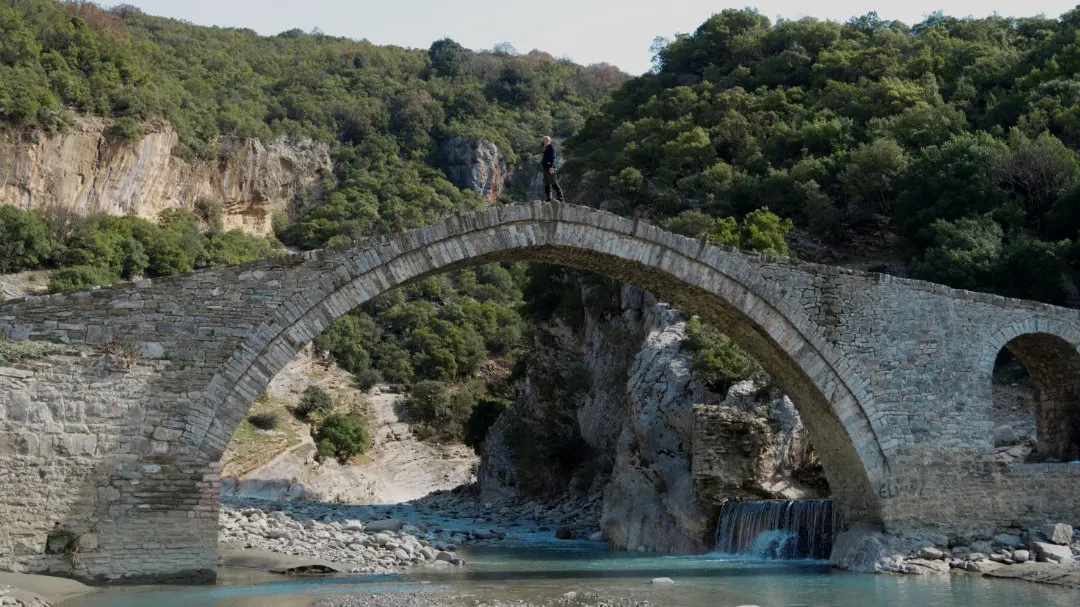
Ottoman Bridge over hot springs in Permet.
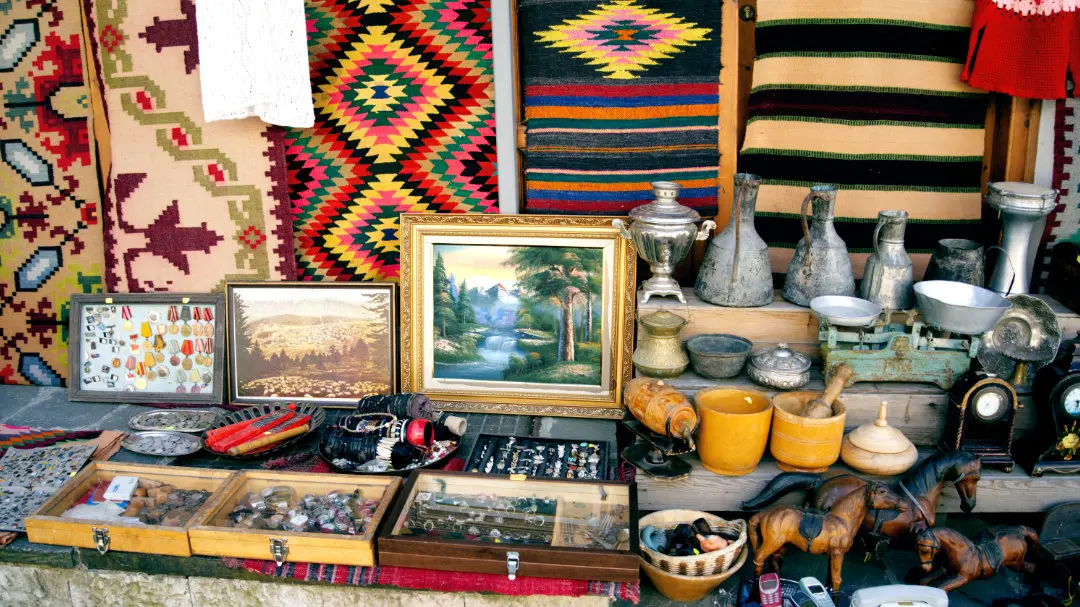
Markets at Gjirokaster
Table of Contents
Albania
People and culture
Albanian people and culture are rich and diverse, with a history spanning thousands of years. Albanians are an ethnic group native to the Balkan Peninsula, primarily residing in Albania and Kosovo, but also in parts of North Macedonia, Montenegro, Serbia, and Greece. Albanians speak the Albanian language, which is an Indo-European language with two main dialects. It definitely takes some practice to get the basics down but well wroth it if you try. The main religions practised by Albanians are Islam, Eastern Orthodoxy, and Roman Catholicism. With the majority being Muslim at 58% of the population. Historically, religious affiliation was often influenced by the ruling powers in the region, such as the Ottoman Empire, which governed Albania for over 500 years. Today, Albania is a religiously tolerant country and very welcoming. Albanian culture is characterised by its strong family values and a code of ethics known as the Kanun, which was a historical code of conduct, Although the Kanun is no longer legally enforced, some elements of it, such as the concept of Besa (a pledge or promise), remain important in Albanian society, which is possibly at the heart of why Albanians are so friendly, hospitable and welcoming. Traditional Albanian hospitality is also renowned, with guests often being treated with great respect and generosity and having travelled around Albania I can honestly say this is the case..
Best time to visit
The best time for van life in Albania in our opinion is out of season or just before or after the main peak season in summer. The weather then is mild and the tourist crowds are minimal. July and August can be quite hot and really busy, especially along the coast, but then again this offers a great opportunity for beach lovers.
Van life in Albania Summer:
Summer is a popular time for van life in Albania, with warm temperatures, sunny days, and numerous outdoor activities. Some highlights of summer van life in Albania include The stunning Beaches: Visit the Albanian Riviera, with its beautiful beaches, crystal clear waters, and charming coastal towns like Dhermi, Himara, and Ksamil. Park your van at one of the many campsites along the coast and enjoy a refreshing swim in the Ionian Sea.
Van life Albania Winter:
Winter in Albania can be cold and snowy, especially in the mountains. If you are visiting Albanian in the winter months, remember to prepare winter tyres and other winter gear your van might need. There are still many activities to enjoy during van life in Albania during the winter months like Skiing: Visit ski resorts such as Valbona or Dardha for skiing and snowboarding opportunities.
Van life Albania Spring & Autumn:
Spring and autumn are ideal seasons for van life in Albania, as the weather is mild and the landscapes are colourful and it isn’t too busy! Highlights of spring and autumn van life in Albania include Nature: Visit the Llogara National Park to witness the incredible foliage changes and enjoy scenic drives through winding mountain roads. We visited Albania in Spring and found it very enjoyable, it was still quite busy at many tourist sights with other vanlifers and tourists but wild parking was easy to find and the weather was good.
Albania’s climate is predominantly Mediterranean, characterised by hot, dry summers and mild, wet winters. The country’s diverse topography, which includes coastal plains, highlands, and mountains, results in some regional variations in climate. In the coastal regions, summers are typically hot and sunny, with temperatures ranging from 25°C to 30°C (77°F to 86°F). Winters in these areas are mild and wet, with temperatures averaging around 10°C (50°F). So prepare your van accordingly.
Practical Travel Advice & Tips
Respect Cultures & Customs
Please extend your respect and acknowledgement of cultures and customs and dress appropriately when visiting religious sights and areas. It’s handy to keep a scarf on you on your travels to throw over yourself if you are going to a Mosque or religious sanctuary.
Use Cash
Albanian Leke and Euros are widely accepted more than credit cards are.
Driving Etiquette
Driving attitudes can be different here and can be somewhat chaotic so be careful on the roads!
Safety
Contrary to popular belief Albania is a safe country! As always you should be careful in big cities and be aware of potential tourist scams.
Things to see
- Tirana
The vibrant capital city is a great starting point for your van life adventure. - Berat
A UNESCO World Heritage Site, this ancient city is known for its distinctive Ottoman architecture. - Gjirokastër
Another UNESCO-listed town, with a stunning fortress and narrow cobblestone streets. - The Albanian Riviera
Explore pristine beaches and charming coastal villages like Dhermi and Himara. - Theth and Valbona
These remote mountain villages in the Albanian Alps are perfect for hiking and nature lovers. - Ksamil
A hidden gem with turquoise waters and idyllic islands, perfect for a beach getaway.
Tasting the local cuisine
Albanian cuisine is heavily influenced by Mediterranean and Balkan flavours, with an emphasis on fresh, locally sourced ingredients. Staple foods include meat, bread, dairy products, and a wide variety of fruits and vegetables. Popular dishes include byrek (a savoury pastry filled with cheese, spinach, or meat), fërgesë (a dish made from peppers, tomatoes, and cottage cheese), and tavë kosi (a baked lamb and rice dish with a yoghurt sauce). Coffee culture is also an essential part of Albanian social life, with people often gathering at local cafés to chat and catch up. You will always be able to find an open cafe in any small town where the locals are out socialising.
Albanian food is a heavily meat-orientated cuisine, whilst there are dishes that are vegetarian and vegan, there may only be one or two on the menu to choose from. And at supermarkets, I (as a vegan) found it difficult to find vegetarian and plant based products. So I would recommend stocking up your van with your favourite essentials before arriving: things like non-dairy milk, condiments, etc.
Tirana
Tirana is the capital and largest city of Albania. It is located in the central part of the country, surrounded by the Dajti Mountain to the east and the coastal plains to the west. With a population of around 800,000, Tirana is not only the political centre of Albania but also its economic and cultural hub. The city is really vibrant and cosmopolitan and is famed for its penchant for colourful buildings. Some of the other most notable landmarks in Tirana include Skanderbeg Square, The Et’hem Bey Mosque, an 18th-century mosque with beautiful frescoes, and the bunk’art museum are also important cultural sites. The city boasts a vibrant café culture, and its streets are lined with restaurants, shops, and galleries.

Ksamil Beach

Benje Hotsprings
Getting there
Albania is well-connected to its neighbouring countries and can be reached by air, land, or sea. The main international airport is Tirana International Airport, which offers connections to many European cities. For those planning to embark on a van life journey, driving to Albania or taking a ferry are popular options.
Ferries
Ferry services connect Albania to Italy and Greece, offering a convenient way to bring your motorhome or camper van into the country. The main ferry routes from Italy include Bari-Durrës and Brindisi-Vlorë.
While from Greece, the Igoumenitsa-Sarandë route is the most popular. Ferry schedules and prices vary, so it’s essential to check for updates before planning your trip. Ferryhopper and Direct Ferries have up-to-date information and you can book on them too.
Borders
Albania shares land borders with Montenegro, Kosovo, North Macedonia, and Greece. Border crossings are generally hassle-free, Ensure you have all the necessary documents, including a valid passport, vehicle registration, and insurance papers.
When we crossed the border we crossed at the furthest western border, next to the coast at Mavromati and Qafe Bote. For us the crossing was extremely easy, we were asked to show passport, license and vehicle registration and that was it.
Visa Requirements
Visa requirements for Albania depend on your nationality. Citizens of the UK, the European Union, the United States, Canada, and several other countries can enter visa-free for stays of up to 90 days within a 180-day period. It’s crucial to check the latest visa information before planning your trip. Check for the most up-to-date information here: E-Visa.AL
Driving Requirements
You need a valid driver’s license and you can also use a valid International Driving Permit |IDP. (Remember you need to get your IDP before travelling, you can get them over the counter at any post office.) You will need valid vehicle Insurance and a green card to prove this. If you do not have a green card you can buy insurance at the border which will cover the duration of your stay. This is a simple and easy process so you shouldn’t worry. Go through the border as you would normally and once you are through past, passport and customs go to the insurance booth and buy it there.
You should proceed with caution on the roads: roads can be quite hazardous with potholes, unfinished sections and rural roads. Albanians are extremely friendly and kind but when it comes to driving it can be a little wreckless and chaotic, so be careful.
Navigating the roads
Entering Albania by vehicle you will need Green card insurance, if you do not have one you can buy it at the border. Road conditions in Albania can be challenging, with winding mountain roads, narrow streets, unfinished and off-road routes and occasional potholes. However, recent improvements have made many routes more accessible, and the main highways are in good condition for all vehicles. There are no tolls in Albania, so you do not have to worry about having to pay extra.
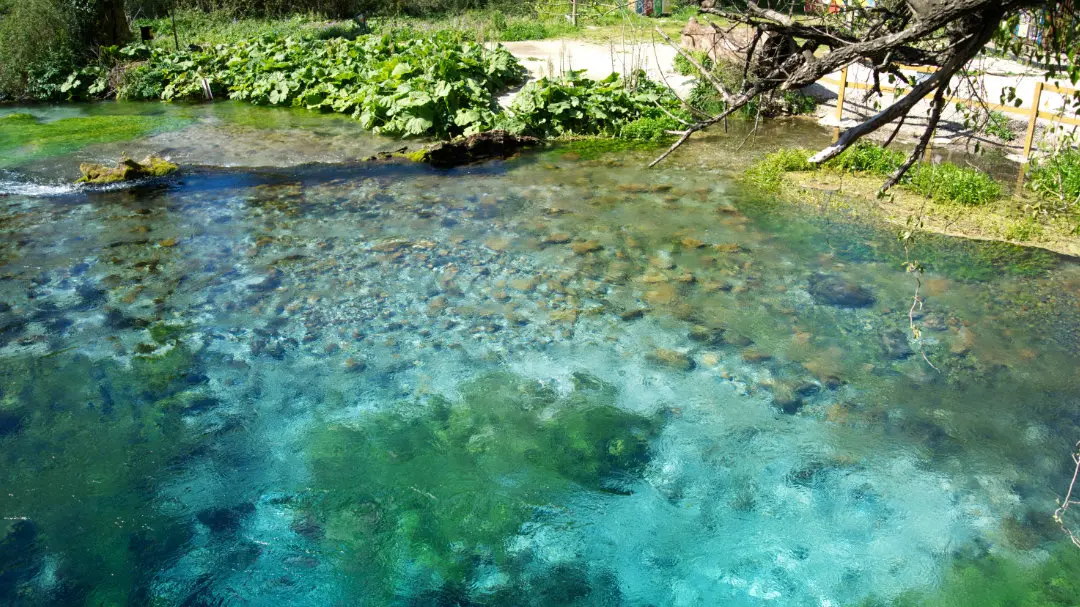
Blue eye

Streets of Gjirokastra
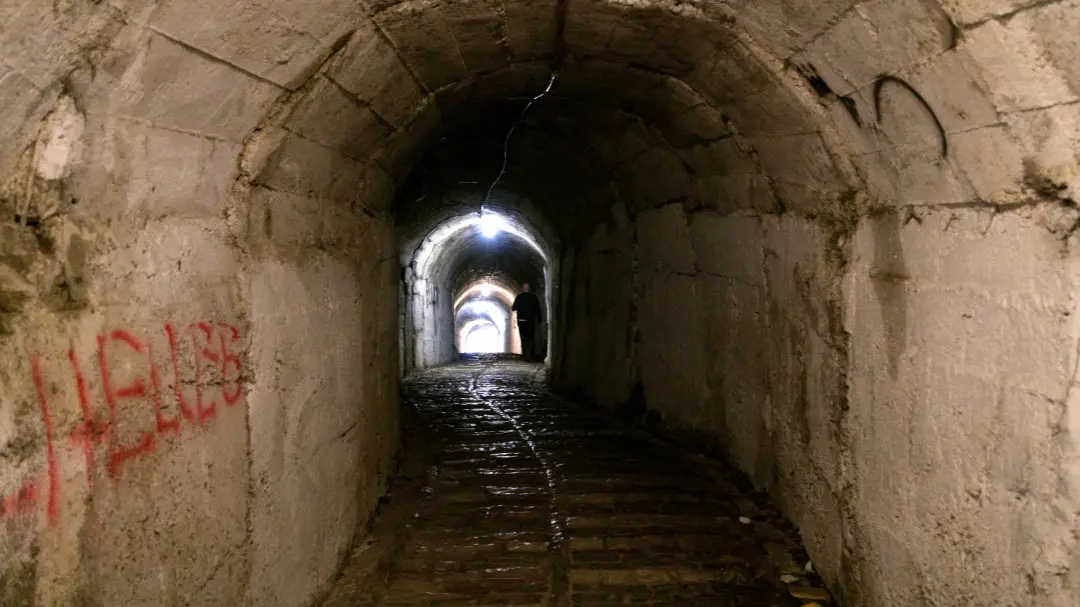
Tunnels of Gjirokastra
Parking
Outwith travel around Tirana, bigger cities and in inner town centres, finding parking in Albania is pretty easy. There is an abundance of parking and it will not be a problem. Our go-to apps were Stayfree, Park4night and ioverlander to find spots but also we found it really easy to find parking without using the apps more so than in other countries.
Routes and road trips
The Albanian Riviera:
Start in Vlorë and drive south along the coast, stopping at picturesque towns like Dhermi, Himara, and Ksamil.
The Northern Loop:
Explore the stunning Albanian Alps, visiting villages like Theth and Valbona, and the breathtaking Komani Lake.
The UNESCO Trail:
Discover Albania’s rich history by visiting UNESCO World Heritage Sites like Berat, Gjirokastër, and Butrint.
Our Itinerary:
We went from south to north along the coast and inland hitting up all the popular sights.
Regions
Berat County
Berat County is home to the UNESCO World Heritage Site city of Berat.
Dibër County
Dibër County is located in the northeastern part of Albania, sharing a border with North Macedonia.
Durrës County
Durrës County lies along the Adriatic Sea, featuring the ancient Roman city of Durrës with its relics.
Elbasan County
Elbasan County is located in central Albania and is home to the historic city of Elbasan, known for its well-preserved castle.
Fier County
Fier County is situated in southwestern Albania and is home to the ancient city of Apollonia and Divjakë-Karavasta National Park, which includes the Karavasta Lagoon, a haven for birdwatchers and nature enthusiasts.
Gjirokastër County
Gjirokastër County is home to the UNESCO World Heritage Site city of Gjirokastër.
Korçë County
Korçë County is located in southeastern Albania and features the picturesque town of Pogradec on the shores of Lake Ohrid.
Kukës County
Kukës County is situated in northeastern Albania and is known for its dramatic mountain landscapes, including the Valbona Valley National Park and the stunning Gjallica Mountain. Key attractions include the towns of Kukës and Fierza.
Lezhë County
Lezhë County is located in northwestern Albania and features the historic town of Lezhë, known for its ancient fortress and the Skanderbeg Memorial. The region also offers the popular beach destination of Shëngjin and the picturesque Drin River Delta.
Shkodër County
Shkodër County is home to the city of Shkodër, the gateway to the Albanian Alps. The region boasts stunning landscapes, including the breathtaking Lake Skadar and the Theth and Valbona National Parks. Key attractions include the historic Rozafa Castle and the Marubi National Museum of Photography.
Tirana County
Tirana County is home to the vibrant capital city of Tirana, featuring a mix of modern urban life, historic sites, and beautiful parks. Key attractions include Skanderbeg Square.
Vlorë County
With gorgeous beaches, Vlorë County is the start of The Albanian Riviera. Expect to see spectacular coastlines of the Ionian and Adriatic sea and beautiful historical sights.
Motorhome & campervan hire Albania
There are many rental companies in Albania that offer motorhomes and camper vans for hire. You may also be able to hire a camper in a neighbouring country and bring it across the border but that depends on the company you go with.
Some Albanian-based campervan rentals are:
Renting Van Albania
Camper Albania
Rental Campervan Balkans
The Albanian Outdoors
Albania boasts a diverse range of national parks, each with its own set of rules and regulations. It’s essential to follow the specific guidelines for each park, which may include restrictions on camping, campfires, and waste disposal. Do your own research and check out these resources for more information on the Albanian outdoors;
Alper
Global Alliance of National Parks
Always practice responsible tourism and leave no trace, or leave it better. Littering is can be a significant environmental issue in parts of Albania, just like in many other countries around the world. In Albania, littering has been caused by several factors, including inadequate waste management infrastructure, lack of public awareness, and weak enforcement of littering regulations, it is however slowly being tackled and you will find many public bins around to utilise.
Wild Camping in your motorhome & camper
Wild camping is allowed in Albania. It is tolerated and the chances are you will most likely be left alone to enjoy your time camping. There is an abundance of rural and natural places all around Albania to park. We wild camped most of our time around Albania and had no troubles. The police even came by one night to tell us we were safe and gave us their number in case we needed anything! If you choose to wild camp, be respectful of the environment, avoid private property, and seek permission from landowners when necessary. Alternatively, consider staying in designated campsites or restaurants/ guesthouses that allow overnight parking for a more secure and comfortable experience.
Finding the perfect campsite
Albania offers a good range of campsites, from basic facilities to more luxurious options. There are many campsites all around Albania, especially along the coast and in tourist areas. You won’t find it hard to find a campsite that suits your needs. The going rate is around upwards of €10 per night per camper (in low season) You can check out and book campsites here.
As well as fully operating campsites, you will find a lot of restaurants, farms and even guesthouses that allow you to stay overnight for free or a fee, they usually have a toilet and some other services you can use, some will have more facilities. This is a good option if you are looking for convenience but not a campsite.

Gjirokaster
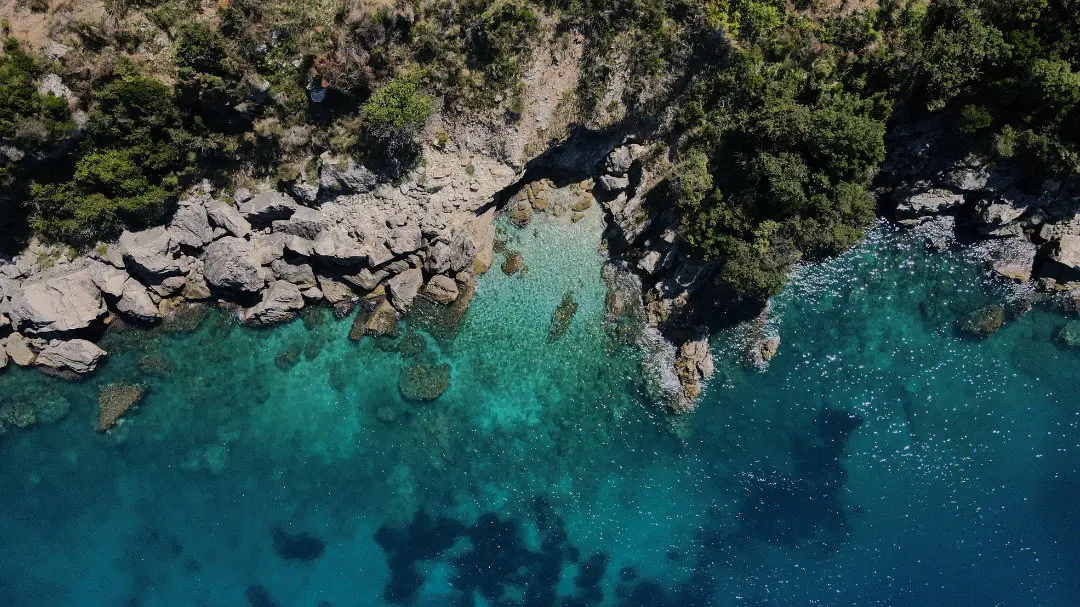
The Coast
Shopping, supplies and amenities
Albania has plenty of markets, supermarkets, and convenience stores. In larger cities like Tirana and Durrës, you’ll find well-known supermarkets. While smaller towns and villages often have local markets with fresh produce. I would recommend stocking up your van with your favourite food products before travelling as a lot of international products can be hard to find, especially if you have dietary requirements or are vegetarian/vegan.
Cost of living
Your money will go a long way here. The Albanian currency is Lek and is currently: £1- 128Lek. Albania is considered one of the most affordable countries in Europe, making it an attractive destination for van life enthusiasts. Food, accommodation, attractions, entertainment and transportation costs are generally low, allowing you to stretch your budget further.
Average prices
- Coffee £1.11
- Milk £1.20 per litre
- Loaf of bread £0.61
- Potato (1kg) £0.64
- Meal for 2- mid-range restaurant £24.00
- Domestic Beer 1/2 litre £1.55
*Price calculated using Numbeo
Public toilets
Public toilets can be found in larger cities and popular tourist areas, often located near parks or main squares. In more remote locations, public restrooms may be scarce, so you may have to rely on restaurants and some petrol stations.
Free water taps
Free water taps are pretty common and can be found in many towns and villages across Albania, often in rural towns, near springs and near public spaces like parks and town squares. They aren’t hard to find. Most petrol stations or highway rest stops also have water taps you can use for free. Can you drink tap water in Albania? Generally yes, it’s safe, to do so. We topped up our tanks at local taps and mainly used that water for washing and used large bottled water for drinking. For more information on water safety check here
Grey and black waste disposal
Disposal facilities for grey and black water are limited in Albania, with most options found at designated campsites. If you find a public toilet you can drain your grey and black water there too, mostly you will have to rely on campsites.
Lpg and Petrol
LPG pumps are available all around Albania. Use myLPG.eu to find LPG in your areas Petrol stations are more common and can be found throughout the country, including cities, towns, and along major highways. Most petrol pumps are staffed, where people will help you pump petrol. The current price of petrol is £1.40| €1.60 per Litre. *Globalpetrolprices
Telephone Networks, Data & Wifi
There are many providers in Albania the three big and popular networks in Albania: ALBtelecom, One and Vodafone. We went for a Vodafone tourist sim which was really easy to get. We found Vodafone had the best deals which were really reasonable. We needed more data so we got the sim package deal. I think you get around 35GB for 2000 Leke (£15.60)
Essential Safety
While Albania is a safe country for travellers, it’s crucial to prioritise your safety during your van life adventure. It is important to keep your common sense and wits about you. Have a good van security system, try not to leave your van unattended and be aware of areas with higher crime, or tourist theft like in city centres and around the coast.
Use apps like what3words to pinpoint your exact location when you need it. In case of an emergency, know the local emergency numbers. The general emergency number in Albania is 112, while the police can be reached at 129, and the ambulance service at 127.
Be aware of getting stuck in mud or sand if you are travelling around coastal areas, especially after adverse weather. We got stuck in the sand at the beach but were luckily pulled out by some friendly locals.
It is recommended that you have good travel insurance when in Albania, if you have a medical emergency, it may be a good idea to use a private hospital over a public hospital. Here is a list of Hospitals in Albania.
Travelling with pets
Travelling in Albania with pets is much like the rest of the European Continent. You will need the following to bring your pets into Albania:
- A pet passport or animal health certificate
- Microchipped
- Fully vaccinated against rabies
- Up-to-date on treatments
The biggest tip for travelling to Albania with pets is to stock up on essential items like cat litter and tinned dog and cat food. We found it was only possible to buy these in bigger stores.
The most important thing to mention about Albania is its stray population. We actually found it better than a few of the neighbouring countries and there weren’t as many as we expected but you do see them. So have your wits about you if you are travelling with your dog off-leash. Be careful also if you travel with cats and let them off leash, as they may pick up viruses or fleas from the strays.

The full team
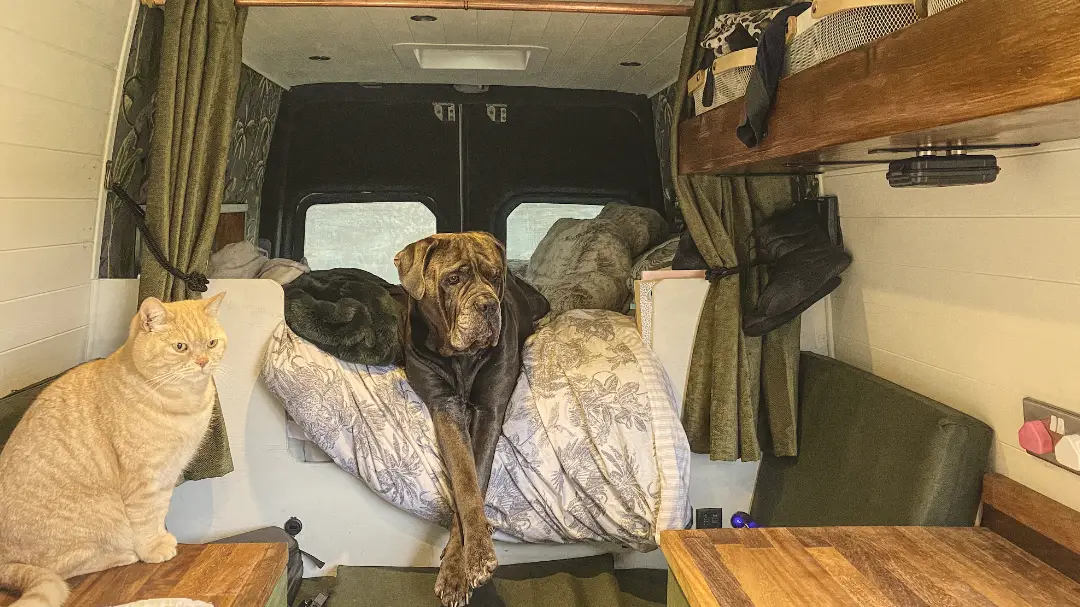
Two of our three good boys
We hope you enjoyed reading as much as we enjoyed writing, please feel free to sign up or leave a comment below if you enjoyed the read!